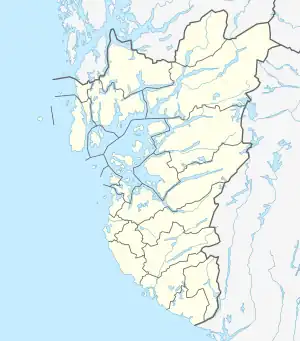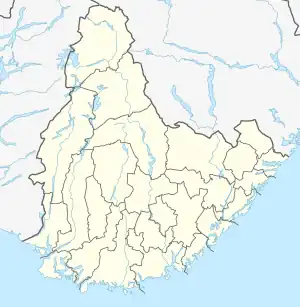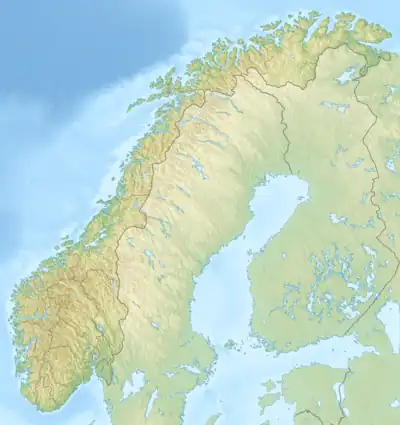| Lundevatn Lundevatnet | |
|---|---|
 View of the lake | |
 Lundevatnet Location of the lake  Lundevatnet Lundevatnet (Agder)  Lundevatnet Lundevatnet (Norway) | |
| Location | Rogaland and Agder |
| Coordinates | 58°24′55″N 6°35′45″E / 58.41538°N 06.59592°E |
| Type | glacial fjord lake |
| Primary inflows | Drivdalsåna, Moisåna river and Sira |
| Primary outflows | Sireåna river |
| Catchment area | 1,899.71 km2 (733.48 sq mi) |
| Basin countries | Norway |
| Max. length | 21 km (13 mi) |
| Max. width | 2.4 km (1.5 mi) |
| Surface area | 27.49 km2 (10.61 sq mi) |
| Average depth | 172 m (564 ft) |
| Max. depth | 314 m (1,030 ft) |
| Water volume | 4.73 km3 (1.13 cu mi) |
| Shore length1 | 59.8 km (37.2 mi) |
| Surface elevation | 49 m (161 ft) |
| References | NVE |
| 1 Shore length is not a well-defined measure. | |
Lundevatn, or Lundevatnet,[1] is a lake on the borders between the municipalities of Lund (in Rogaland county) and Flekkefjord (in Agder county) in Norway. The village of Moi lies at the northern end of the lake and the smaller village of Åna-Sira lies just south of the southern end of the lake. The lake has a small dam at the southern end and it is used for the nearby Åna-Sira Power Station.[2]
The 27.49-square-kilometre (10.61 sq mi) lake is about 25 kilometres (16 mi) long. It is the ninth-deepest lake in Norway and extends about 265 m (869 ft) below sea level and since it sits at an elevation of 49 m (161 ft), the maximum depth of the lake is 314 m (1,030 ft). This overdeepening, as well as its long and narrow shape, are characteristics of glacially-formed lakes.[2]
See also
References
- ↑ The suffix "-et" is a form of the Norwegian language definite article and means "the". Hence Lundevatnet is equivalent to "the Lundevatn." Both forms can be found in English language text.
- 1 2 Store norske leksikon. "Lundevatn" (in Norwegian). Retrieved 2016-07-22.